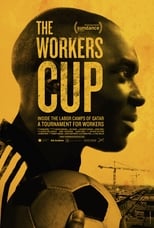Now that WC 2018 has finished in Russia (Congratulations to Les Bleus!), the eyes of the world turn to WC 2022 in Qatar. But as happened with Russia, the eyes of football fans are blind to the exploitation and corruption that FIFA has facilitated for these two tournaments. The Workers Cup might open your eyes a little, but to me, Adam Sobel’s film normalizes the conditions in Qatar.
First-time Director Sobel had lived in Qatar for 5 years, and he did not want to do yet another exposé. Qatar would not have allowed such access anyway, as discussed in my post The Slavery Side of World Cup Soccer and Dirty Games.
Sobel instead chose to explore the lives of migrant workers by following a team during a 6-week Qatari tournament known as the Workers Cup. The aim of Qatar’s Supreme Committee for Delivery & Legacy was
“to use the power of football to encourage positive social change within Qatar. Every year workers from businesses in various commercial sectors of Qatar take the advantage of participating in the tournament to transcend the regular restraints of the working environment…”
Sports washing
For Qatar and Russia, the whole point of hosting the World Cup is to showcase their countries on the world stage and sports wash their autocratic, homophobic, and racist societies. In a similar vein, the Workers Cup was created in 2013 to counter European concerns about the exploitation of migrant workers and their human rights. The tournament also became a marketing vehicle for companies who recruit migrant workers, as it demonstrated that worker life in Qatar was not just drudgery.
But as Sobel subtly points out, working in Qatar is full of drudgery. Like 60% of the country’s population, the players of GCC, the Gulf Contracting Company, live in labor camps and eat in military-style mess halls. GCC players have relatively upscale 2-bed dorm rooms, but the labor camps are gated to keep the laborers inside. A worker was stabbed by a roommate, who they speculate just wanted to be sent back to Bangladesh.
A player is ashamed to tell his friends back home how he really lives. The migrants are warned not to go to the mall. Since labor camps are located an hour’s ride outside of the cities, and many work everyday, they would have trouble getting to one anyway. Migrants cannot bring their families to Qatar unless they make $2,750 per month, and even a white collar Nepali player only makes $400.
The tournament
The soccer in the film consists of GCC’s key moments in the 2014 tournament. It is well-captured, and some of the players have fair skills, having played in Ghananian leagues. Kenneth, the captain of the team, was falsely recruited by a football agent in Ghana, who told him he could find a club in Qatar (not true, as 5 years of residency is required). But the Workers Cup tournament is basically rec league. And just like in any rec league, some of the teams bring in last-minute ringers. Still, playing football gives the workers’ lives meaning, entertainment, camaraderie, and joy. But it’s only 6-7 weeks, and then it’s over.
In interviews, filmmaker Sobel talked about highlighting the resilience of the workers, but in this film, it’s not resilience I see, but resignation. One player says life in Qatar may be hell, but it is better than heaven back home in Africa. After 8 years in Qatar, a Nepali player hasn’t even saved enough money to buy a car back home. As he discusses his time in Qatar with a friend, they reminisce about various buildings where people died during construction. The friend tells him,
“You have to find a place to put all the sorrows in your life.”
Whether it’s resilience or resignation, the problem with the film is that the suffering and indignities are normalized. It is accepted that the worker’s lot in life is to be exploited as an asset that can sweep, cook or clean. “Money flows like a river in Qatar”, but it barely trickles for these workers. Is it unfair exploitation, or is it a unique opportunity for people with the tiniest of options?
7 Soccer Movie Mom Rating = 7
Resources:
- Released: 2017-01-19 (Sundance)
- In English, Nepali, Malayalam, Twi, Ga, Hindi, Arabic with English sub-titles
- IMDB
- Director: Adam Sobel
- Stars: NA
- Watch the Trailer
- You may be able stream the film for free through your PBS station
- The Workers Cup film Website

